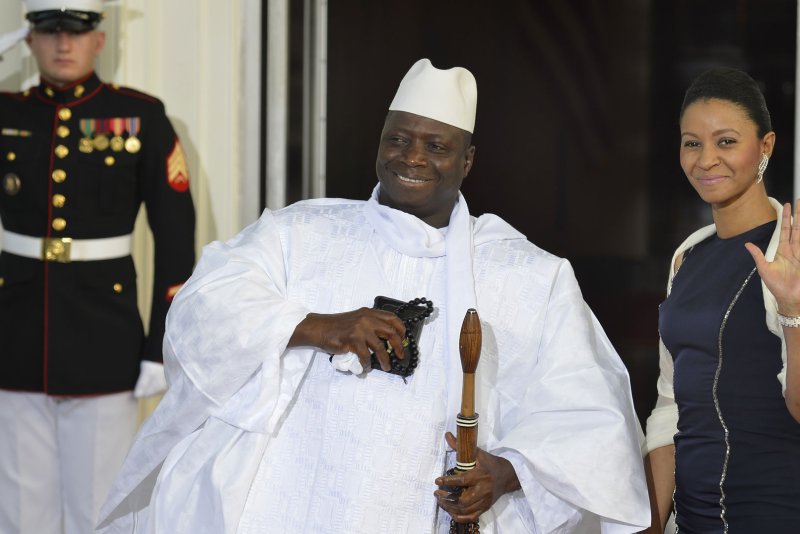1 of 2 | President of Gambia Yahyah Jammeh and First Lady Zineb Jammeh greet the press as they arrive at the White House for a State Dinner on behalf of the U.S.-Africa Leaders Summit, August 5, 2014, in Washington, D.C. Nearly 50 heads of state and government from Africa are attending the summit to advance business, agriculture, development and infrastructure interests on the continent. Photo by Mike Theiler/UPI |
License Photo
Jan. 19 (UPI) -- Gambian President Yahyah Jammeh was ceremoniously removed from power on Thursday, and could be physically removed from the presidential palace by military troops if he doesn't leave.
The forced transition is expected to bring an end to the historic standoff between the 23-year leader and challenger Adama Barrow for control of the country. Barrow defeated Jammeh in the nation's Dec. 1 election, winning 45 percent of the vote.
Jammeh initially conceded defeat to Barrow but rejected the vote tally eight days later, claiming that an illegitimate election result did not require him to leave office.
In an unusual move early Thursday, Barrow, 51, took the oath of office at the Gambian embassy in neighboring Senegal, as a safety measure.
Later, a coalition of West African troops in Senegal crossed the border into Gambia to enforce Barrow's installation. Nations of the Economic Community of West African States (ECOWAS) deployed troops to the Gambia-Senegal border on Wednesday night in case Jammeh refused to leave.
"The ECOWAS [nations] have unanimously decided in their meeting to use the Standby Force for deployment in the Gambia," the Nigerian military said. "The aim is to implement the decision of ECOWAS leaders in upholding the result of the presidential election."
Jammeh, who took power in July 1994 as the leader of a military coup, has tried to have the vote results invalidated and called for a new election. Top Gambian legislative and judicial officials briefly extended Jammeh's term, but the weight of his authority dissolved when the international community began formally dismissing his presidential status.
Several government officials have resigned during the saga and thousands of civilians fled the country.
There were fears that Gambian citizens loyal to Jammeh might protest in the streets, and that the Gambian National Guard, an elite military group largely of the same ethnic group as Jammeh, could fight ECOWAS troops trying to install Barrow.
Jammeh declared a state of emergency Tuesday and said he filed an application with the Gambian Supreme Court to prevent Barrow's inauguration. His declaration also called for civilians to maintain law and order.
Jammeh has presided over a government that has repeatedly drawn international criticism over human rights abuses and systemic oppression. He has also been condemned for encouraging violence against the Gambian gay community.
"If you do it (homosexuality) I will slit your throat," he said in 2015. "If you are a man and want to marry another man in this country and we catch you, no one will ever set eyes on you again."















